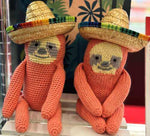*** Free UK delivery on orders over £100 ***
Menu
-
- New
-
Yarn
- Stitching
-
Hooks & Needles
-
Accessories
-
All Accessories
- Blocking
- Books and Magazines
- Buttons
- Cable Needles
- Chart Keepers
- Darning Needles and Pins
- Needle and Hook Cases
- Notebooks and Stationery
- Pom Poms
- Row Counters
- Rulers and Needle Gauges
- Scissors
- Sewing
- Stitch Holding Cords
- Stitch Markers
- Stitch Stoppers
- Swifts and Winders
- Wool Wash
- Yarn Bowls
- Yarn Snugs
- Other
- Bags
- Brands
-
All Accessories
-
Patterns & Kits
-
Gifts
- Sale
-
How to & Ideas
-
- Login

*** Free UK delivery on orders over £100 ***
Crochet Hook Sizes
August 15, 2022 5 min read

Wondering what size crochet hook to use? We've got you covered! Read on for our complete guide to crochet hook sizes and yarn weight. Your next project is sure to be a winner!
Contents
- What do crochet hook sizes mean?
- How to measure a crochet hook
- Crochet hook size chart
- Crochet hook sizes and yarn weight
- Most common crochet hook size
- What happens if I use a smaller crochet hook?
- What happens if you use a bigger crochet hook?
What do crochet hook sizes mean?
A crochet hook consists of a long handle with a hook at one end. As you work through your project, you'll slip yarn over that hook to create stitches. Crochet hooks come in all different sizes. If you're working with thin yarn to create delicate lace, you'll want a smaller one; on the other hand, a blanket made from chunky yarn will require a much larger hook.
How are crochet hooks measured? Just to confuse things, there are several different size systems. Some use letters, others numbers, others metric measurements. However, one thing that all crochet hook sizes have in common is that they measure the diameter of the hook's shaft.
A crochet hook conversion chart, as shown below, can help explain the differences between systems. In general, the USA uses letters, which go up as the hook gets bigger (so a C hook is bigger than a B, for example). Japan uses ascending numbers, with a 2 hook being very small and a 10 being very large. Confusingly, the UK used to use descending numbers: a 14 is tiny, while a 1 is extremely large. Nowadays, though, most crochet hooks in the UK are sold with metric measurements, with the diameter of the shaft indicated in millimetres.
How to measure a crochet hook
Many crochet hooks will have the size printed or embedded somewhere on the handle. However, that isn't always the case. Trying to measure a crochet hook by sight is extremely tricky, as the difference between two sizes can be very small. It's best to use a crochet hook gauge to check sizes. These handy tools have holes in them. Slip your hook through the holes to test its size. Your hook should fit very snugly into the hole of the right size.
Crochet hook size chart
If you're buying crochet hooks nowadays in the UK, you can expect them to be sold with metric measurements. However, older crochet hooks or hooks that you bought abroad might use a different system. If you're using an older British pattern, or patterns from the US or Japan, it's important to know how to convert sizes. This chart will help you.
| Old UK | Metric | US | Japan |
|---|---|---|---|
| Old UK14 | Metric2mm | USB | Japan2 |
| Old UK13 | Metric2.25mm | US- | Japan3 |
| Old UK12 | Metric2.5mm | USC | Japan4 |
| Old UK11 | Metric3mm | US- | Japan5 |
| Old UK10 | Metric3.25mm | USD | Japan- |
| Old UK9 | Metric3.5mm | USE | Japan6 |
| Old UK8 | Metric4mm | USG | Japan7 |
| Old UK7 | Metric4.5mm | US- | Japan7.5 |
| Old UK6 | Metric5mm | USH | Japan8 |
| Old UK5 | Metric5.5mm | USI | Japan- |
| Old UK4 | Metric6mm | USJ | Japan10 |
These are not the only sizes of crochet hooks available, but they are the most common. You will also find extremely fine hooks for very delicate projects, as well as much larger, bulky hooks for working with extremely thick yarn.
Crochet hook sizes and yarn weight
When you start working from a pattern, it will usually include a recommended hook size for the yarn weight. If you're not sure what size crochet hook for double knitting wool, for example, the following table gives a general overview of the most common recommendations:
| Yarn Weight | Hook Size |
|---|---|
| Yarn WeightLace / 1 ply | Hook Size1.5 - 2.25mm |
| Yarn WeightFingering / 2 ply | Hook Size2.25 - 3mm |
| Yarn WeightSock / 4 ply | Hook Size2.5 - 3.5mm |
| Yarn WeightSport / 5 ply | Hook Size3.5 - 4.5mm |
| Yarn WeightDK / 8 ply | Hook Size4.5 - 5.5mm |
| Yarn WeightAran / Worsted / 10 ply | Hook Size5.5 - 6.5mm |
| Yarn WeightChunky / 12 ply | Hook Size6.5 - 9mm |
| Yarn WeightSuper Chunky / 14 ply | Hook Size9mm + |
This table should only be used as a guide; there's no single definitive answer to the question of what size crochet hook for chunky wool! There are two important factors to take into account: the item you're making, and your crochet gauge.
First, think about the item you're making. If it's a light, airy shawl or scarf, then you may want to use a larger hook size. On the other hand, if you're making something with a 3D texture - such as a hat, a basket, or an amigurumi figure - you will need to use a smaller hook to get the correct tension. A larger hook will leave your piece looking floppy and won't give it that all-important form.
You should also consider your crochet gauge. Every crocheter is different: some of us make looser stitches, some of us tighter. It helps to make a gauge swatch before you start a project, so you can see what your stitches look like, measure them, and adjust the hook size if needed. Most patterns will include a gauge (number of stitches per cm/inch) that you should aim for to get the best results.
Most common crochet hook size
Of course, some projects require very small crochet hooks, and others need very large ones. However, if you're new to crochet and want to pick up a couple of hooks to get started, stick to the middle of the range. 4, 5 and 6mm hooks are all very handy. They're not too small (which can be fiddly to work with, especially for beginners), and they're not uncomfortably large. As you do more crochet, you might find yourself branching out into different kinds of project, but medium sized hooks are always a great starting point.
What happens if I use a smaller crochet hook?
A crochet hook that's smaller than the pattern intends will give you a tighter fabric. Sometimes that's desirable, especially if you're making something with a 3D design. However, at other times it can be a problem. This is particularly true if you're making a top, hat, or other kind of garment. With a hook that's too small, it might not fit!
It's also important to remember that negative space is essential in crochet patterns. If you're making a lacy pattern, then using a smaller hook will lose some of that negative space, drastically changing the finished piece.
What happens if you use a bigger crochet hook?
Using a bigger crochet hook than recommended will give you a looser fabric. It will drape better, which you might like. On the other hand, it will lose any firm shape. A larger hook is not suitable if you're making amigurumi, pot holders, or other pieces that need to be slightly stiff.
A bigger hook can also cause problems for garments, as they may turn out larger than intended, and won't fit well. It will generally be less of a problem for unfitted pieces like scarves and shawls, where a bigger needle creates a lacier effect.
Summary
Ready to start crocheting? Make sure you've got the right hook! It's always better to check in advance, by measuring your hook and making a gauge swatch, rather than spend hours on a project that's not quite right. Yarn Worx stocks some of top brands of crochet hooks, including Tulip, Furls and Chiaogoo. Grab your hook and get going!
Learn more about pairing needles to yarn with our Knitting Needle Guide.
Also in Yarn Guides

What is boucle yarn?
March 21, 2025 2 min read
Boucle yarn is a popular material for knitting that creates a unique textured fabric. Learn everything you need to know about boucle with our in depth guide!

How to crochet a magic circle
May 19, 2023 4 min read

5% off your first order when you join our email newsletter...
Be the first to know of new product releases and other exciting news! A discount code will be sent to your email straight away!


